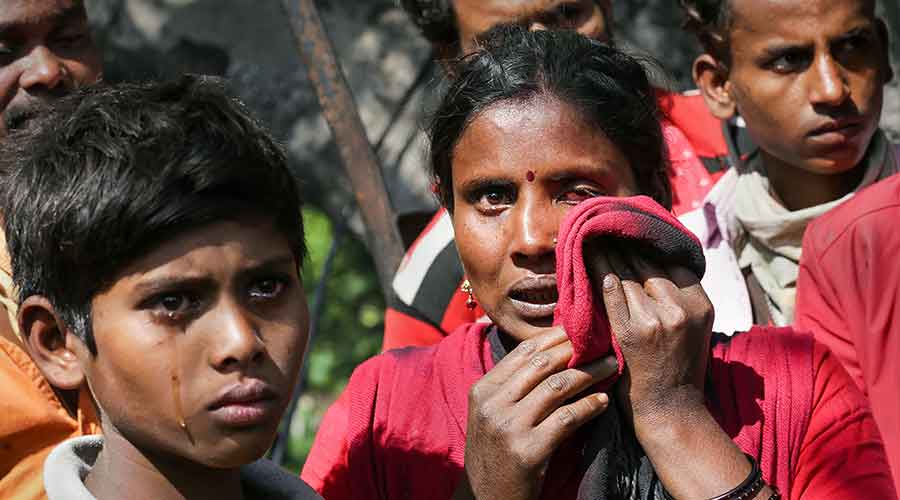A Bihar mason currently working at a construction site on Srinagar’s outskirts never thought of leaving Kashmir in the past 15 years, even during the mayhem that accompanied the three mass summer agitations this period witnessed.
Not even in 2019, when a brutal clampdown following the dilution of Article 370 paralysed life for months.
But a spate of killings of migrant workers over the past fortnight has left him and his colleagues jittery. Hundreds of migrant workers have been shifted to army camps overnight for their safety while hundreds others have left the Valley.
The vast majority including the Bihar mason have, however, stayed back, still banking on Kashmiri hospitality. But they have their fingers crossed.
“I’m praying the situation eases but we are receiving frantic calls from our families asking us to return. We got such calls in the past too but this time things here look different,” the man in his 30s told The Telegraph. His identity is being withheld for his safety.
“Our hosts keep reassuring us but you naturally feel afraid when you see pictures of the slain men all over (social media). There were some killings (of non-Kashmiris) in 2019 too, but this time there’s been one attack after another. People have lost their lives even in Srinagar.”
Two Bihari labourers were killed and a third worker was injured in a suspected militant attack in Kulgam on Sunday evening. A day earlier, a golgappa vendor from Bihar and a carpenter from Uttar Pradesh had been killed in Srinagar and Pulwama.
Eleven civilians, including five migrant workers, have been murdered and nine soldiers killed in a gunfight in Poonch in what is being seen as the biggest militant challenge facing the security establishment since the 2019 scrapping of Jammu and Kashmir’s special status.
With seven of the slain civilians being non-Muslim, the killings are being construed as a militant design to force religious minorities out of the Valley.
The killings have been widely condemned in the Valley, but they followed months of what many say were “not-so-cordial relations” between local people and non-Kashmiris.
The Bihar mason said non-Kashmiris were seldom attacked in the past but he could smell a change after the 2019 amendment to Article 370.
“Apart from earning good money, we were treated well. But something big happened in 2019,” he said.
“It’s not that we were humiliated, but we could see people starting to suspect us, thinking we were up to something. We are poor and have nothing to do with politics.”
Many here believe that Jammu and Kashmir’s special status was scrapped so that hordes of outsiders could be brought in to reduce Muslims to a minority in the Vally.
A local engineer, who heads a construction company and employs some 150 migrant workers, said the non-local employees occasionally asked why the Kashmiris had turned a little indifferent to them.
“They would complain that the old warmth in relations was missing; rather, the local people seemed to expect them to mind their own business,” he said.
“Fortunately, nobody in my team has left. But around 50 of them are sitting idle and some might prefer leaving. Otherwise, too, winter has set in early and this is the time they start leaving.”
The militants and their handlers across the frontier are trying to exploit the fault-lines.
At Srinagar’s Tourist Reception Centre, migrant labourers were seen trickling out in groups. But most were careful not to link their departure to the killings.
“We were working in the Kulan area of Ganderbal. It was getting very cold there, so we decided to return,” a group of workers from Bettiah in Bihar said. Some others said they were leaving to celebrate Diwali with their families.
Pramod Gupta, a carpenter from Khushi Nagar in Gorakhpur, Uttar Pradesh, said he wouldn’t leave. He said he had never faced any problems in the past or felt scared.
“I never heard about any Kashmiri killing any outsider before. I don’t know what has happened now — something has happened this time,” he said. “I was here in 2008, 2016 and 2019. I never fled.”
A new pro-independence agitation had begun in 2008 after the government decided to hand over a tract of land to the Shri Amarnath Shrine Board, which many claimed was a move to settle outsiders. In 2016, the Valley was rocked by a month’s agitation over the encounter killing of Hizb poster boy Burhan Wani.
Labour commissioner Abdul Rashid War said that migrant workers had traditionally been treated well in Kashmir.
“In March last year, when the pandemic broke out, we had some 50,000 (non-local) workers here, of whom just 2,700 wanted to return home,” he said.
“The rest stayed on and weathered the lockdown with help from the government and local people.”
Lakhs of migrant workers come to Kashmir every year, forming the backbone of its construction industry.










